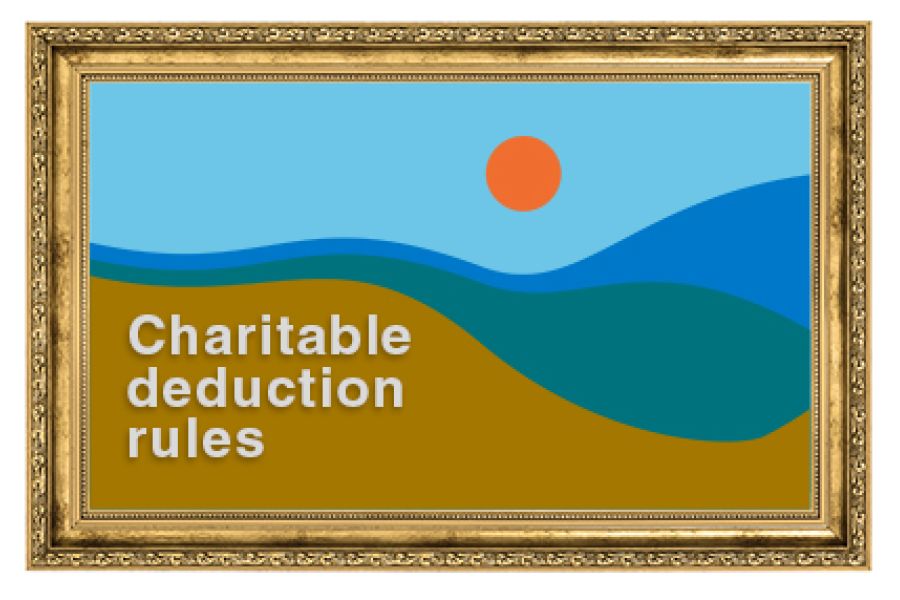If you own a valuable piece of art, or other property, you may wonder how much of a tax deduction you could get by donating it to charity. The answer to that question can be complex because several different tax rules may come into play with such contributions. A charitable contribution of a work of art is subject to reduction if the charity’s use of the work of art is unrelated to the purpose or function that’s the basis for its qualification as a tax-exempt organization. The reduction equals the amount of capital gain you’d have realized had you sold the property instead of giving it to charity. For example, let’s say you bought a painting years ago for $10,000 that’s now worth $20,000. You contribute it...

Studies have found that more people are engaging in online gambling and sports betting since the pandemic began. And there are still more traditional ways to gamble and play the lottery. If you’re lucky enough to win, be aware that tax consequences go along with your good fortune. Review the tax rules Whether you win online, at a casino, a bingo hall, a fantasy sports event or elsewhere, you must report 100% of your winnings as taxable income. They’re reported on the “Other income” line of your 1040 tax return. To measure your winnings on a particular wager, use the net gain. For example, if a $30 bet at the racetrack turns into a $110 win, you’ve won $80, not $110. You must separately keep track of losses....
Given the escalating cost of health care, there may be a more cost-effective way to pay for it. For eligible individuals, a Health Savings Account (HSA) offers a tax-favorable way to set aside funds (or have an employer do so) to meet future medical needs. Here are the main tax benefits: Contributions made to an HSA are deductible, within limits, Earnings on the funds in the HSA aren’t taxed, Contributions your employer makes aren’t taxed to you, and Distributions from the HSA to cover qualified medical expenses aren’t taxed. Who’s eligible? To be eligible for an HSA, you must be covered by a “high deductible health plan.” For 2021, a high deductible health plan is one with an annual deductible of at least $1,400 for self-only coverage,...
Many homeowners across the country have seen their home values increase recently. According to the National Association of Realtors, the median price of homes sold in July of 2021 rose 17.8% over July of 2020. The median home price was: $411,200 in the Northeast, $275,300 in the Midwest, $305,200 in the South, and $508,300 in the West. Be aware of the tax implications if you’re selling your home or you sold one in 2021. You may owe capital gains tax and net investment income tax (NIIT). Gain exclusion If you’re selling your principal residence, and meet certain requirements, you can exclude from tax up to $250,000 ($500,000 for joint filers) of gain. To qualify for the exclusion, you must meet these tests: You must have owned the property for...
As we approach the holidays and the end of the year, many people may want to make gifts of cash or stock to their loved ones. By properly using the annual exclusion, gifts to family members and loved ones can reduce the size of your taxable estate, within generous limits, without triggering any estate or gift tax. The exclusion amount for 2021 is $15,000. The exclusion covers gifts you make to each recipient each year. Therefore, a taxpayer with three children can transfer $45,000 to the children every year free of federal gift taxes. If the only gifts made during a year are excluded in this fashion, there’s no need to file a federal gift tax return. If annual gifts exceed $15,000, the exclusion covers the...
In recent weeks, some Americans have been victimized by hurricanes, severe storms, flooding, wildfires and other disasters. No matter where you live, unexpected disasters may cause damage to your home or personal property. Before the Tax Cuts and Jobs Act (TCJA), eligible casualty loss victims could claim a deduction on their tax returns. But there are now restrictions that make these casualty loss tax deductions harder to take. What’s considered a casualty for tax purposes? It’s a sudden, unexpected or unusual event, such as a hurricane, tornado, flood, earthquake, fire, act of vandalism or a terrorist attack. More difficult to qualify For losses incurred through 2025, the TCJA generally eliminates deductions for personal casualty losses, except for losses due to federally declared disasters. For example, during the summer...
Employer-provided life insurance is a coveted fringe benefit. However, if group term life insurance is part of your benefit package, and the coverage is higher than $50,000, there may be undesirable income tax implications. Tax on income you don’t receive The first $50,000 of group term life insurance coverage that your employer provides is excluded from taxable income and doesn’t add anything to your income tax bill. But the employer-paid cost of group term coverage in excess of $50,000 is taxable income to you. It’s included in the taxable wages reported on your Form W-2 — even though you never actually receive it. In other words, it’s “phantom income.” What’s worse, the cost of group term insurance must be determined under a table prepared by the IRS even...
There may be a tax-advantaged way for people to save for the needs of family members with disabilities — without having them lose eligibility for government benefits to which they’re entitled. It can be done though an Achieving a Better Life Experience (ABLE) account, which is a tax-free account that can be used for disability-related expenses. Who is eligible? ABLE accounts can be created by eligible individuals to support themselves, by family members to support their dependents, or by guardians for the benefit of the individuals for whom they’re responsible. Anyone can contribute to an ABLE account. While contributions aren’t tax-deductible, the funds in the account are invested and grow free of tax. Eligible individuals must be blind or disabled — and must have become so before turning...
If your child is fortunate enough to be awarded a scholarship, you may wonder about the tax implications. Fortunately, scholarships (and fellowships) are generally tax free for students at elementary, middle and high schools, as well as those attending college, graduate school or accredited vocational schools. It doesn’t matter if the scholarship makes a direct payment to the individual or reduces tuition. Requirements for tax-free treatment However, scholarships are not always tax free. Certain conditions must be satisfied. A scholarship is tax free only to the extent it’s used to pay for: Tuition and fees required to attend the school and Fees, books, supplies and equipment required of all students in a particular course. For example, expenses that don’t qualify include the cost of room and board, travel,...
If you have a parent entering a nursing home, you may not be thinking about taxes. But there are a number of possible tax implications. Here are five. 1. Long-term medical care The costs of qualified long-term care, including nursing home care, are deductible as medical expenses to the extent they, along with other medical expenses, exceed 7.5% of adjusted gross income (AGI). Qualified long-term care services are necessary diagnostic, preventive, therapeutic, curing, treating, mitigating and rehabilitative services, and maintenance or personal-care services required by a chronically ill individual that is provided under care administered by a licensed healthcare practitioner. To qualify as chronically ill, a physician or other licensed healthcare practitioner must certify an individual as unable to perform at least two activities of daily living (eating, toileting,...











